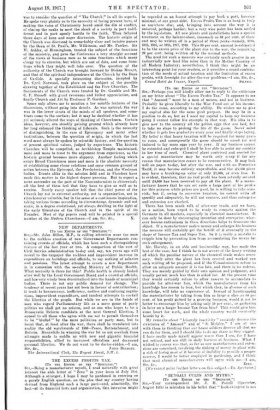fTo THE EDITOR OP TEE " SPECTETOR.".1
Sia,—Perhaps you will kindly allow me to reply to the criticisms on my letter about "The Excess Profits Tax." It appears to ma that " Amazed " must be a man of means, and not in business. Probably he gives-liberally to the War Fund out of his income. I do the same, according to my ability. He wishes me to give my capital also for the same good purpose. lie may be in a position to do so, but as I need my capital to keep my business going I cannot follow his example in that way. His idea is to give now to the country all the golden eggs that are laid, but to take no steps to prolong the life Of the goose. Never mind whether it gets less productive every year and finally slops laying. My belief is that heavy taxation will be required for many years to come, and consequently the goose should be cared for and induced to lay more eggs year by year. If my business cannot he extended and enlarged I shall be less able to assist my country in her time of need. Chemical plant contrived and erected for a special manufacture may be worth- only scrap if for any reason that manufacture ceases to be remunerative. It may look well on paper to-day, but after the war, and with no Protective Tariff, it may become entirely unprofitable, and the £5,000 plant may have a breaking-up valor of only 21,000, or even less. It is evident, therefore, that no real profit has been actually secured until e4,000 has been reserved to pay off the plant. If a manu- factru•er knows that he can set aside a large part of his profits for this purpose while prices are good, he is willing to take some risk; but if, owing to excessive taxation, lie cannot writs off speedily and adequately, he will not venture, and thus enterprise and extension are checked.
There has been much talk of after-war trade, and we have, as a nation, been urged to be ready to compete against the Germans in all markets, especially in chemical manufacture. It can only be done by encouraging invention and enterprise; what- ever lessens enthusiasm in those directions helps to frustrate the object. If a manufacturer makes money and enlarges his business the revenue will certainly get the benefit of it eventually in the shape of Income Tax and Super Tax. So it is really a mistake to cripple him by preventing him from accumulating the means for such enlargement.
Mr. Herlihy, in an able and businesslike way, has made the best of the case; but I think he is not aware of the heavy writing off which the peculiar nature of the chemical trade makes neces- sary,. Only after the plant has been erec•teri and worked can such writing off be proposed, and if the Commissioners refuse to allow an adequate amount it is too late, and there is no redress. They are mainly guided by their own opinion sod judgment, and usually permit muck leas than is asked for. At the present time they would certainly refuse to allow reserve to necumulate to provide for after-war loss, which the manufacturer from Isis knowledge has reason to fear, but which they, in absence of such knowledge, will take no cognisance of. Instead of handicapping the manufacturer by taking from him on large a slice as 80 per cent. of his profit gained by a growing lousiness, would it not he better to encourage him by asking only 50 per cent., or gathering in later on a larger Income Tax from him? This would give him some heart for work, and time whole country would eventually benefit by it.
Sly remarks about " leisurely inactivity " certainly deserve the strictures of "Amazed" and of "S. Mitigley." I am at one with them in thinking that our brave soldiers deserve all that we can do for them, and I should like to do my share as they suggest. I have really Lunde myself appear worse than I am, for I have not retired, and ant still in daily harness at lousiness. What I wished to convey was that, as for as new manufactuces and exten- sions are concerned, involving the sinking of money in plant with a risk of losing most of it because of inability to provide a proper reserve, I would be better employed in gardening, and I think that most chemical manufacturers will agree with me.—I am,


























 Previous page
Previous page